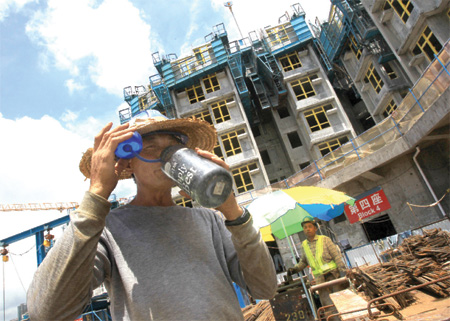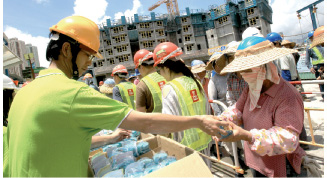Dying to make a living
Updated: 2011-06-28 06:54
By Kane Wu(HK Edition)
|
|||||||
|
A workers drinks water during a break at a work site. Photo by Edmond Tang |
Hong Kong's construction work force is getting old. Young people aren't interested in earning a living under the hot sun, facing the prospect of death by heart attack, heatstroke and leaving behind destitute families, while construction companies deny liability. Kane Wu reports.
Zhu jinghong was a happy housewife, raising a son and a daughter at home. Her husband worked for a construction company. Zhu's happiness was short-lived. Her husband, 48-year-old Lai Kam-leung, died while at work last December. There was a surreal aspect to his sudden demise while in the process of moving some construction materials at a Causeway Bay work site. Lai suddenly collapsed, and fell into unconsciousness.
"Just half an hour ago (before he fainted) he was telling me on the phone that he would come home right after the work. I would never have guessed it would be the last time we spoke," recalls Zhu, her voice trembling with emotion.
That terrible afternoon imprinted itself in her memory, like a series of motion pictures.
"I kept calling him but nobody picked up the phone. And then an hour later one of his colleagues called and told me to hurry to the hospital near his workplace."
Zhu was too late. By the time she got to the hospital, her husband had died.
"I felt like the sky was falling. For a moment my mind went completely blank. I didn't know what to do," Zhu says.
The 41-year-old woman, originally from Shenzhen, had just been reunited with her husband in Hong Kong the previous year.They had been married over 20 years.
Under the current Employees' Compensation Ordinance, an employer is liable to pay compensation only when an employee suffers an injury or dies from accidents "arising from and in the course of his employment" or from "an occupational disease".
Lai died of a heart attack. His employer, Wah Cheong Construction, Design and Engineering Company, denied all liability. The company boss, who lived close to Zhu's apartment and had been a friend to the couple, asked a worker to drop off HK$200 at Lai's funeral. After that Zhu was never able to contact him. He didn't go the hospital the day Lai died. He didn't bother to show up at the funeral.
"The family wouldn't have been able to afford a funeral, but for the donations from the Hong Kong Construction Industry Employees General Union (HKCIEGU)," Cathy Hung, assistant secretary general of the union, tells China Daily.
Hung, a registered social worker, has been following Zhu's case from the beginning.
"We suspect the heart attack had something to do with Lai's heavy workload but it is difficult to prove that," she says.
|
Volunteers from the Hong Kong Construction Industry Employees General Union hand out free bottles and towels to workers at a work site. Photo by Edmond Tang |
After Lai's death, Zhu had to give up the rented apartment where her family lived. She and the kids moved to her father-in-law's house in Yuen Long. Her son, 20, is studying for a diploma at a community college. Her daughter is still in high school. Zhu, who cannot read or write, got a job at a restaurant in Tsuen Wan. She earns HK$28 an hour, the minimum wage, working 10 hours a day.
"My father-in-law was running around garnering help and advice from social workers. I don't know anything about Hong Kong law and I have no idea how to deal with this," Zhu says.
Things got worse. In late April, her father-in-law died. The old man's health had started to decline after his son died.Now there was no one Zhu could rely upon.
Zhu's story is not so rare. As of mid-June, six workers died of heart attacks or heatstroke at work this year. In each case the life of an entire family was turned upside down.
There's another recent case. This time the victim was a 50-year-old plumber named So. He was working outside in the sun at Tai Po industrial village on June 2. It was 33 degrees.
"Half of Hong Kong's 275,000 construction workers are over 50. Many have health problems they don't even know about," says Chow Luen-kiu, chairman of the HKCIEGU.
"The intense nature of construction work is very likely to induce coma or sudden death to the aged, especially when the weather gets hot."
Normally such cases end up in court. It is left to the courts to determine the cause of death and the amount of compensation, if any. If the court rules the case comes under the Employees' Compensation Ordinance, the victim's family is entitled to compensation ranging from 36 to 84 months' earnings, depending on the worker's age. The company is also held responsible for all funeral and medical attendance expenses. But the law suits are costly and time-consuming. Most families of workers' have no resources to take their case to court.
"The union helps families apply for the Ordinary Legal Aid Scheme that covers the cost of civil proceedings," Chow says.
"But 90 percent of the sudden death cases get no compensation in the end."
Solicitor Peter Wong, who provides free legal counseling service to union members, tells China Daily that sudden death cases are often controversial. In the first place, it is difficult to determine the employment status of the workers.
The Employees' Compensation Ordinance stipulates that all employers (including contractors and subcontractors) are required to take out insurance policies to cover their liabilities for injuries to all employees, both under the ordinance and at Common Law. Some self-employed workers, however, may not be covered.
The hardest part is to determine whether the death was caused directly by work.
"It is almost impossible to provide evidence proving that illnesses like heart attacks, heatstroke or cerebral apoplexy are caused by work," he says. "I haven't seen a single case in which the worker who died of those diseases got any compensation."
In Lai Kam-leung's case, the government didn't even grant Zhu legal aid. She was told in late April that her husband died of natural causes, which are not covered by the ordinance. That settled, Zhu received another piece of bad news. Her husband's employment status at the time of his death was open to dispute because the company that employed him no longer existed.
"The boss changed the name of his company after the incident so the government has no record of the previous one," Hung says. "Employers always try to escape their responsibility."
Chow says most companies are not as mean-spirited as Lai's employer. They tend to give out a certain amount of compensation and close the door privately.
"Most families get some HK$50,000-100,000 from the companies, which barely covers funeral expenses, much less the living needs of a whole family," he says.
Chow was an interior construction worker for almost 30 years before he joined the union. He knows how tough life can be for workers and their families.
"Construction workers work like hell and don't enjoy holidays. And this is how companies treat them when they die? Even worse they would treat a dog!"
Most construction workers, Chow says, have stay-at-home wives, school-age children and parents who are too old and too weak to take care of themselves. When the workers die, the families they leave behind are pitched into a huge financial abyss.
The union, together with the Hong Kong Construction Association Ltd, the Hong Kong Federation of Electrical and Mechanical Contractors Ltd, the Hong Kong Construction Sub-contractor Association Ltd and lawmaker Abraham Shek, set up a Construction Charity Fund in October 2009, providing immediate relief to the families of deceased construction workers.
"Now we give HK$100,000 to every family, regardless of the cause of death. And no further liabilities of the company involved in the case will be examined. Families can contact the union directly and get the money within a week if they pass our assessment," Chow says.
The construction association will also help family members find jobs in the construction sector, if needed, he adds.
So far, the fund has sponsored 49 families of construction workers in the amount of HK$3.9 million.
The fund gets HK$2 million from the construction association every year. The rest of the money is raised among all the other partners.
"We are worried that the money might not be enough," Chow says. "We are also trying to talk to other funds and parties about making donations to the workers."
However, he says funds and donations from society are just a buffering tool. He thinks the government should play the essential role.
With the support from lawmakers from the Hong Kong Federation of Trade Unions, Chow is pushing for a new Employees' Compensation Ordinance that makes all workers who die at work sites eligible for compensation, regardless of their cause of death.
"Workers on the mainland are entitled to compensation if they die a sudden death at work, Hong Kong should do the same," he says.
"We also hope the government will set an example by allocating money from the security funds of its own construction projects to specifically compensate families of deceased construction workers."
Cathy Hung, on the other hand, suggests the government do more to follow up cases.
"Most wives of construction workers are not well-educated and get completely lost when their husbands die. The Labour Department should take the initiative to investigate the cases and provide both financial and emotional aid to family members," she says.
Zhu says she tried to contact the Labour Department for assistance but was told only that she should follow the regulations on her own. Her husband's case pretty much ended when she failed to get the legal aid to proceed to court. Fortunately with Hung's help, Zhu Jinghong at least was able to collect HK$100,000 from the Construction Charity Fund.
"I can get by," Zhu says. "I just want to bring back my husband's bag that he left at the work site that aftesrnoon. That's all."
But the boss never answers the phone.
wuyue@chinadailyhk.com
(HK Edition 06/28/2011 page4)

